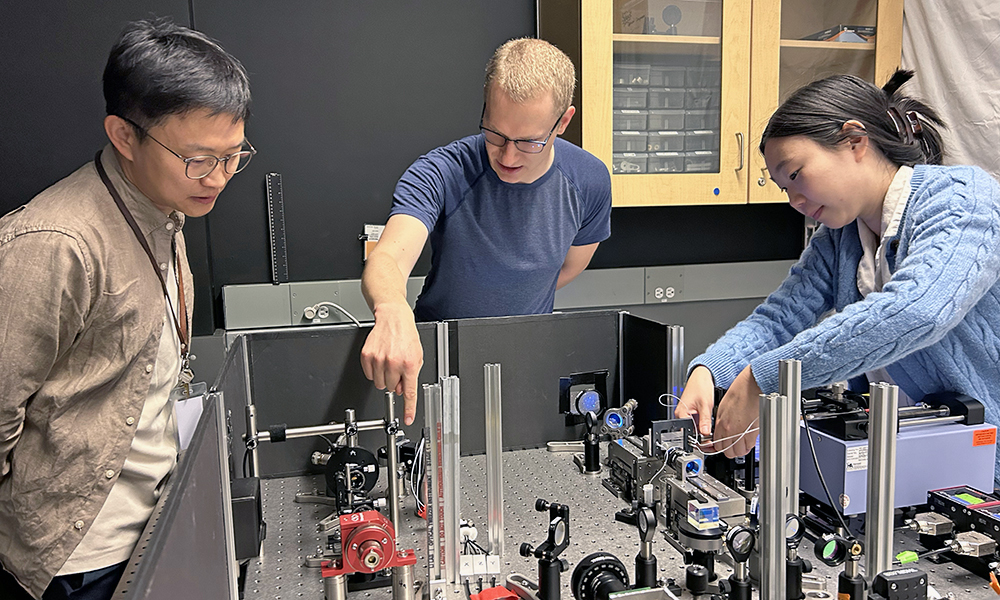
UBC Okanagan professor Dr. Kasun Hewage stands in the Engineering, Management and Education Building.
Electric vehicles and smart buildings are realities, but can technology be improved as researchers work to keep BC ahead of the curve in energy efficiency?
A renewed research collaboration between FortisBC and UBC Okanagan seeks to do this and more as a grown-in-the-Okanagan smart-energy success story begins a new chapter.
Five years ago, FortisBC, Mitacs and UBC created the Smart Energy Research Chair position to help optimize provincial energy and reduce BC’s greenhouse gas footprint.
Professor Kasun Hewage, with UBCO’s School of Engineering, was appointed to this role, which has just been renewed for another five years.
The research has focused on four theme areas: building energy performance enhancement, clean technologies for climate change mitigation, BC Energy Step Code implementation and demand side management.
“As a society, we cannot make informed and sustainable energy choices if we don’t understand the environmental, financial and social implications—what we call the complete lifecycle—of each of those choices,” says Dr. Hewage. “Over the past five years, we have made a significant contribution to the smart energy knowledge base, and our researchers are making an impact in municipalities, government and industries across BC, Canada and internationally.”
Dr. Hewage says the renewed funding will allow UBC to continue its independent research to address BC’s growing energy needs and improve the sustainable use of energy sources.
An Associate Director with UBC’s Clean Energy Research Centre, Dr. Hewage takes a holistic approach to investigating smart energy strategies, including cost-effective, sustainable and renewable energy production systems coordinated by cutting-edge technologies.
By evaluating the implications and cost-benefits of a diverse variety of smart energy solutions, Dr. Hewage says UBC researchers can continue to provide policymakers with invaluable data.
“In this next phase, we will be looking at topics such as the practical realities of implementing hydrogen gas and enhancing electric vehicle charging networks with considerations for wider EV use in public transit,” says Dr. Hewage.
“The renewal of this chair means we can continue to grow UBC Okanagan’s expertise in sustainable technologies and work with stakeholders like FortisBC to advance current tools and strategies—and suggest new ones—to improve energy sustainability throughout the province.”
Dr. Hewage is also part of a multidisciplinary network of UBC researchers—the Cluster of Research Excellence in Green Infrastructure—who develop new tools, techniques, policies and best management practices to address municipal infrastructure challenges, including climate resiliency and the environment.
The cluster integrates the expertise of researchers in engineering, economics, geography and the social sciences.
“We’re thrilled FortisBC is continuing to work with UBCO to pursue greener, more efficient energy solutions that will lead to a more sustainable future,” says Dr. Suzie Currie, Associate Vice-President and Vice-Principal, Research and Innovation.
“At UBCO, we’re committed to pursuing climate change mitigation and adaptation strategies. Partnerships such as this that help investigate cleaner energy alternatives are a key part of advancing that work and achieving success.”
In addition to the funding from FortisBC, the renewed appointment will continue to be supported by matching internship funding from Mitacs. This will allow students to engage with FortisBC, whenever necessary, throughout this five-year collaboration.
Training students and providing research opportunities for them is an important aspect of this partnership, explains Danielle Wensink, Director of Conservation and Energy Management for FortisBC.
“With energy efficiency and conservation being key to transitioning to a lower-carbon energy future, we’re pleased to continue our support of UBC Okanagan through the Smart Energy Chair,” Wensink says. “We look forward to seeing more UBCO students become leaders in the field as well as finding opportunities to apply their research in ways that lower energy use, reduce overall greenhouse gas emissions and ensure affordable, resilient energy systems for our customers.”


